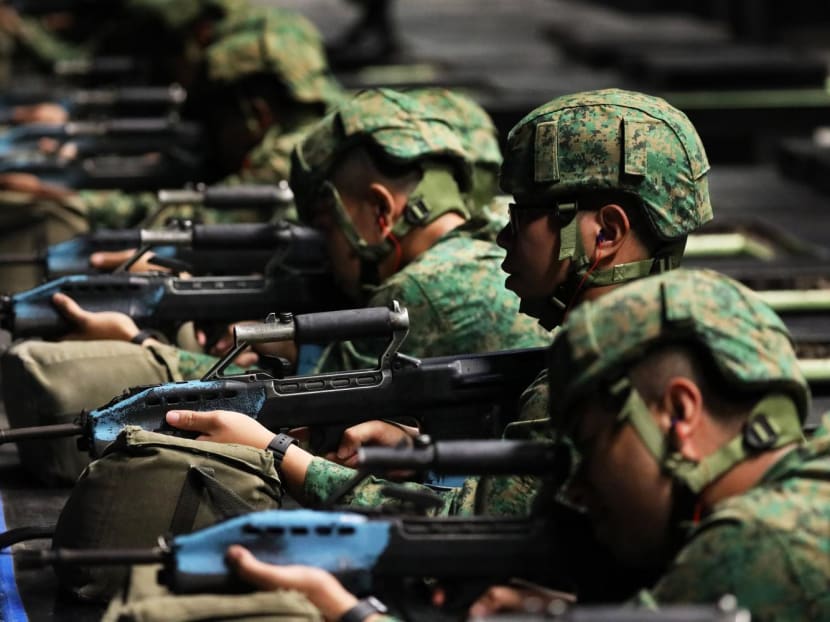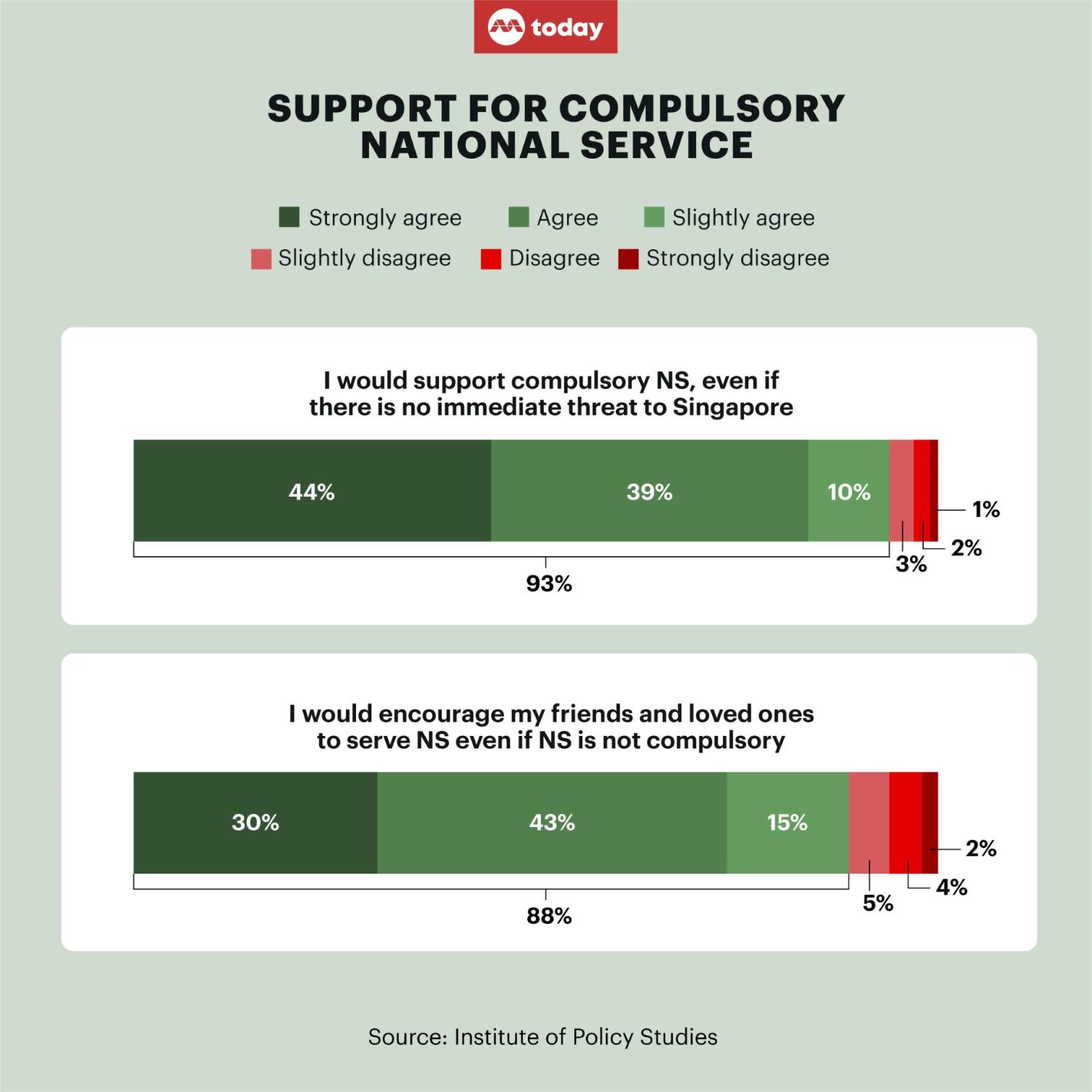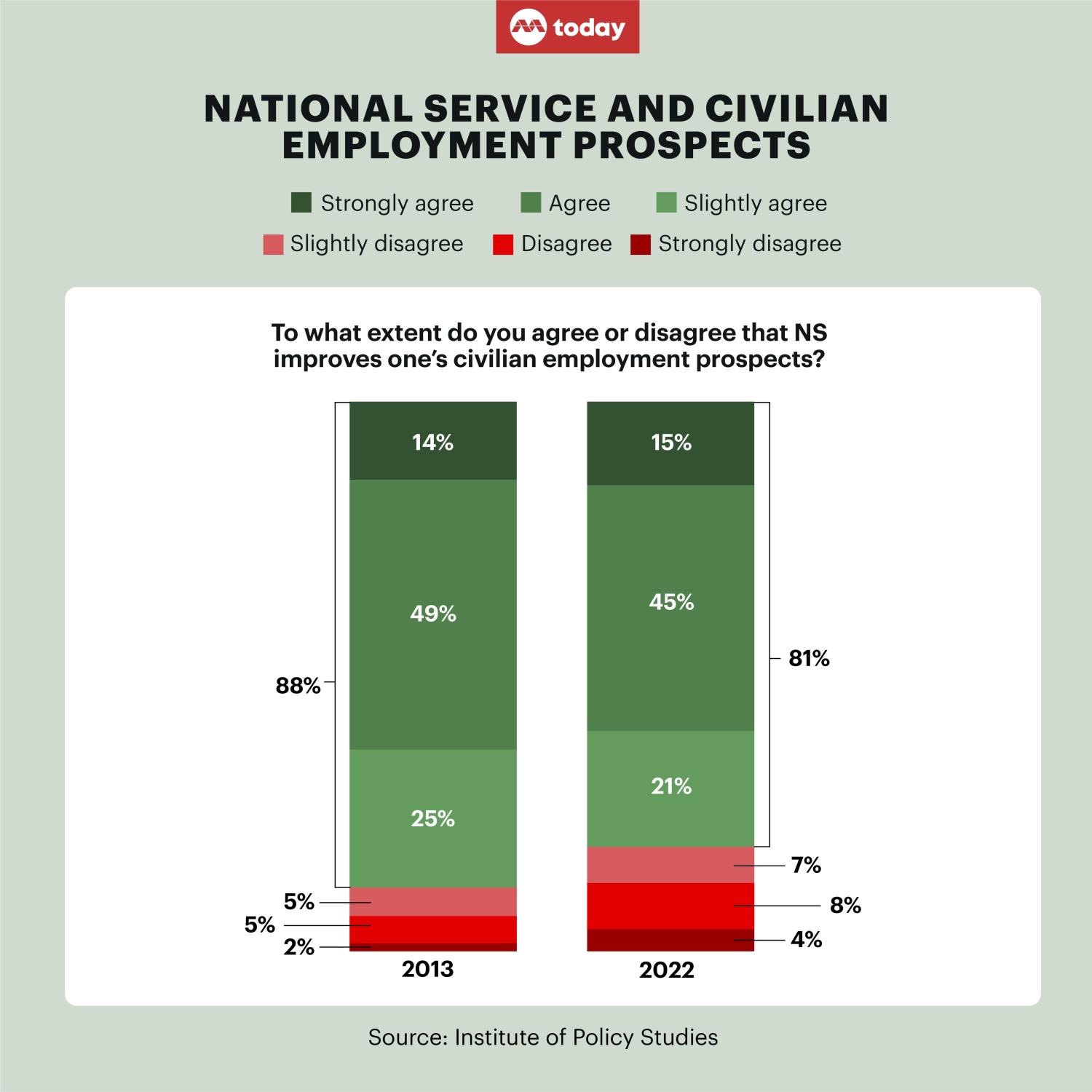Public support for NS stays high but more feel it does not offer enough job skills: IPS study
SINGAPORE — Public support for National Service (NS) in Singapore remains very high, but more believe that NS does not provide enough employable skills relevant to career development, a study published by the Institute of Policy Studies (IPS) on Wednesday (July 5) found.

Recruits at an indoor shooting range in Pulau Tekong on June 29, 2021.
- More than nine in 10 of Singaporeans surveyed said they would support compulsory NS
- However, compared to 2013, more also feel that NS is less important for learning skills useful for civilian employment
- Researchers cited Singapore’s emphasis on the need to embrace skills upgrading as a potential reason for this perception
- The findings were part of a study conducted by the Institute of Policy Studies on public attitudes towards NS
SINGAPORE — Public support for National Service (NS) in Singapore remains very high, but more believe that NS does not provide enough employable skills relevant to career development, a study published by the Institute of Policy Studies (IPS) on Wednesday (July 5) found.
More than nine in 10 respondents to a survey said that they would support compulsory NS even if there were no immediate threats to Singapore, with 88 per cent also saying that they would encourage their friends and loved ones to serve NS even if it were optional.
The study, funded by the Ministry of Defence (Mindef), involved a nationally representative survey on 1,002 Singapore citizens and permanent residents (PRs), as well as focus group discussions and personal interviews with respondents. It was conducted during the second half of 2022.
Almost all respondents agreed that NS is necessary for Singapore’s defence — with the proportion that strongly agreed with this statement rising to 57 per cent from 42 per cent the last time a similar survey by the IPS was conducted in 2013.
At the same time, the study found a notable decline in the perceived importance of NS in learning skills useful for civilian employment.
Compared to 2013, a lower proportion (71 per cent) of respondents thought that NS is important for learning skills useful for civilian employment — down from 82 per cent a decade ago.
In a statement responding to the study's finding, Mindef said that it was "encouraged by the strong support for NS" identified by the study.
Mindef would also take into account potential areas of improvement identified by the study "as we continually review how to strengthen the NS system", the statement added.
Mindef said it "recognises the importance of supporting our national servicemen in their transition to employment or higher education" and outlined various measures in place to support this process.
The study aimed to better understand public sentiments on NS in order to improve the NS experience.
WHY IT MATTERS
Past studies have also shown a similarly high level of confidence for NS among respondents.
In the 2013 IPS study, a proportion of more than 90 per cent of those surveyed had also said that they supported NS.
A similar proportion of operationally ready national servicemen (NSmen) also generally felt that their employers were supportive of NS, with more than three-quarters of employed servicemen saying their employers would take their NS commitments into account and adjust their workload.
A separate poll conducted by market research consultancy Blackbox Research in February 2019 found that just over 80 per cent of the 908 survey respondents agreed with the statement that compulsory NS remain crucial to Singapore’s security.
The poll, commissioned by news website Yahoo News, also found that more than half of respondents (56 per cent) felt that the two-year length of NS should be reduced.
Dr Chew said on Wednesday that the IPS report did not cover perceptions on the length of NS, and strong concerns about the topic did not come up organically during their focus group discussions.
The IPS study follows discussions in recent years over how NS could possibly disrupt careers of national sportsmen.
For instance, national swimmer and Olympic gold medallist Joseph Schooling had said last year that it was challenging to balance his NS duties with swimming.
The researchers said on Wednesday that it had found it timely to conduct another such study last year given that Singapore’s demography had changed, along with the education, work and geopolitical landscape.
For example, compared to when the last study was conducted, people are now more educated and have different expectations of NS, said Dr Chew.
Likewise, geopolitical tensions such as the Ukraine crisis are also at the forefront of people’s minds, he added.

WHAT THE STUDY FOUND
Broadly, the study found that respondents strongly supported compulsory NS.
Focus group discussions conducted by the researchers also found that geopolitical tensions might have heightened the perception that NS will continue to be important for Singapore in the future, with several participants of the discussion citing examples such as the Ukraine war.
- Almost all respondents agreed that NS is necessary for Singapore’s defence, as well as to provide the security required for Singapore to develop and prosper
- Nearly all respondents (97 per cent) agreed that NS will continue to be important for Singapore in the future, with about 57 per cent strongly agreeing with that statement
- When asked if males should still serve NS if it were not compulsory, parents in focus groups voiced their support as they thought that NS helped with their sons' maturity and confidence. Many servicemen also felt that their experiences during NS were formative and memorable
- Most (93 per cent) would support compulsory NS, even if there were no immediate threat to Singapore
- Almost as many (88 per cent) would also encourage their friends and loved ones to serve NS, even if it were not compulsory
- Nearly all national servicemen (96 per cent) felt that their families are supportive of their NS commitments. Moreover, nearly all employed national servicemen (95 per cent) agreed that their employers are supportive of their NS commitments
The survey also found that employer support for NS remained high.
- A smaller proportion felt that their employer prefers to hire those without NS commitments in 2022 (36 per cent) compared to 2013 (42 per cent), suggesting an improvement in employer support for NS
- National servicemen believed that employers have to show support for NS due to the mandatory nature of their reservist commitments, and HR decision-makers of both smaller and larger firms felt the same way — although some were concerned about the resource costs to the company
- Three in four (75 per cent) employed national servicemen agreed that their employer adjusted their workload in consideration of their NS commitments, at least to some extent
Nevertheless, the findings also found that respondents viewed NS as less important for learning useful skills for employment. Some servicemen, parents and females in focus groups and interviews also noted that NS involved some trade-offs over education, career and earning potential.
- 81 per cent of respondents agreed that NS improves one’s civilian employment prospects, down from 88 per cent in 2013
- NS was viewed as less important for learning skills useful for civilian employment, with the proportion of respondents who found it important dropping from 82 per cent in 2013 to 71 per cent in 2022

WHY CAREER SKILLS ARE SEEN AS IMPORTANT
While NS is viewed as important for building a national identity and for fostering social cohesion among other maturation functions, NS may increasingly be seen as a disruptor of work given the pace of change in the labour market, said the researchers.
Mr Shane Pereira, one of the researchers involved in the study, told the media on Wednesday that Singapore’s emphasis on the need to embrace lifelong learning and skills upgrading could help to explain this drop in numbers.
“We don't want our children, or ourselves as NSmen and servicemen, to not do anything in camp,” he said.
“There's this impression that after the first year and a half of full-time NS, the last six (months is) when you're actually doing more routine activities, so it seems like you have a lot of time. So because of this nature of 'I want to learn more' (both parents and NSmen feel that) maybe we should fill this time with more activities.”
Findings from the study also revealed that many parents interviewed in focus groups suggested having more non-military training for national servicemen to broaden their skill sets in preparation for their transitions out of NS — whether as a student or worker.
Dr Chew added that this is something Mindef should “definitely keep in mind and stay ahead of the curve”, adding that more opportunities could be given to national servicemen to attend courses such as those on financial management and how to write CVs in their final months of service.
Overall, the findings affirm that there is a strong conviction that NS contributes to national defence and economic development, the researchers said.
Said Mr Pereira: “Belief in the necessity of NS for Singapore’s defence remains strong. This strong societal affirmation on the value of NS provides an important basis and foundation upon which Mindef can design its policies to enhance the NS experience.”













